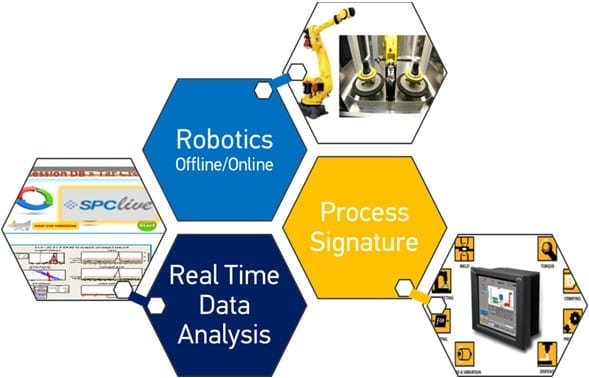“Manufacturing defects are a huge issue for the industry. In some cases, 50% of production can end up as scrap because of defects, while in some complex manufacturing lines the rate of scrap can be as high as 90%,” explains Odd Myklebust, the IFACOM coordinator at the Norwegian University of Science and Technology in Trondheim.1
Statistical Process Control (SPC) is the most common tool used in the manufacturing industry to detect defects in the products or the process. The method employs sampling method to measure and assesses conformance or variance to given specifications periodically. Data is plotted, and when a variance is flagged, production is stopped, and it is fixed. While this process has demonstrated the ability to produce excellent products, it relies on periodically inspected data to control quality. By the time data is inspected, a defect is detected, and a solution is considered, an entire batch or batches of products are manufactured. Manufacturing companies are, therefore, exploring ways to optimize the use of their resources while minimizing cost.
By aiming for zero defects in total quality management through continuous improvement approach, companies can improve their productivity and performance. “When we inspect for quality, we hope to find any problems. When we prevent the problems from occurring, we cause quality to happen,” says Weiss.2
“Quality is through process and NOT by inspection” – Toyota Motto
The question is, how?
Today, manufacturing companies make use of the latest and emerging technologies to enhance shop floor productivity and safety, influence demand, and deliver new services and product models. They can use these technologies to develop new frameworks that would help build scalable solutions, with faster returns. Some of the things that manufacturing companies can do to attain zero defects:
Lean operation: Integrate all the required documents related to Process Planning, Fixture Design Support, and CNC Program Report into the product lifecycle management (PLM). This will ensure optimized performance of various cross-functional activities and minimize waste.
The LEAN approach aims at improving and modifying (if required) the existing process flow of parts assembly area. This is supported by an analytical model of the current state by identifying all aspects of the assembly or production line, value stream maps, and non-value add activities; rationalize the input-output load conditions and flow patterns that are unique to each operation; and propose rate increasing solutions through various recommendations and monument specification reports.
Predictive analysis: Catch the defect before it occurs, is the new mantra of the manufacturing industry today. Statisticians aided with Big Data Analytics combined with Monte Carlo and Bayesian Simulations are building applications, which predict the quality well in advance so that countermeasures can be applied effectively. In some cases, the system itself adjusts the errors and calibrates to the required quality, known as Autonomous Validation.
Focus on live data: Network manufacturing systems and capture live data. By enabling automatic measurement and real-time quality control at the factory level, companies can monitor production and diagnose faults immediately.
Closed-loop technology will give 100% real-time and automated quality inspection data. This empowers the frontline of manufacturing industries with quick and on-the-spot decision-making. The technology enables data intelligence modules using process signature techniques to quickly identify the cause of issues affecting production and post-process analysis for all manufacturing data.

Transformational Solution – Zero Defects
[1] https://ec.europa.eu/programmes/horizon2020/en/news/intelligent-approach-zero-defect-manufacturing
[2] http://www.qualitydigest.com/april05/articles/05_article.shtml
